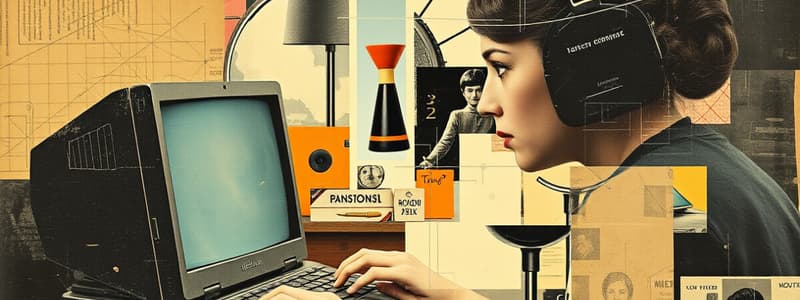Podcast
Questions and Answers
How has traditional research changed with modern technology?
How has traditional research changed with modern technology?
- It still requires physical library visits.
- Information can now be accessed through search engines. (correct)
- Research is now exclusively conducted offline.
- Purchasing physical books is the only method.
What has changed in the way people communicate compared to pre-internet times?
What has changed in the way people communicate compared to pre-internet times?
- Instant messaging allows for real-time conversations. (correct)
- In-person conversations are prioritized over written communication.
- Phone calls are now unnecessary.
- Writing letters has become the primary communication method.
How has travel navigation improved with the advent of the internet?
How has travel navigation improved with the advent of the internet?
- Travel information is mainly obtained through inquiries.
- Traveling requires a guide for all navigation.
- Navigation now primarily uses printed maps.
- Digital map applications provide real-time directions. (correct)
What is a significant benefit of online shopping compared to traditional shopping?
What is a significant benefit of online shopping compared to traditional shopping?
In what way has banking transformed with modern technology?
In what way has banking transformed with modern technology?
How have online platforms influenced the formation of relationships?
How have online platforms influenced the formation of relationships?
What aspect of entertainment has significantly changed with technology?
What aspect of entertainment has significantly changed with technology?
What has become possible in healthcare with the rise of online resources?
What has become possible in healthcare with the rise of online resources?
How has marketing evolved in the digital age?
How has marketing evolved in the digital age?
What has changed in job searching with the introduction of the internet?
What has changed in job searching with the introduction of the internet?
Study Notes
Research and Education
- Traditional research required visits to libraries or purchasing physical books; now, information is accessible with a simple Google search.
- Skill acquisition, such as singing or painting, previously required in-person classes; today, online platforms like YouTube offer extensive learning resources.
Communication
- Before the internet, communication involved writing letters, which could take days to reach the recipient; now, instant messaging apps facilitate real-time conversations globally.
Travels
- Prior to the internet, navigation relied on physical maps and local inquiries; now, digital map applications provide real-time directions and extensive travel information online.
Shopping
- Physical shopping required visiting multiple stores; online shopping allows customers to browse from home, read reviews, and compare prices conveniently.
Financial Services
- Historically, banking involved waiting in long lines for transactions; modern banking allows for online operations from personal devices, any time.
Relationships
- Forming romantic connections used to require direct interaction; now the internet enables continuous communication through texting and social media platforms.
Entertainment
- Watching movies required being present at scheduled showings or renting physical media; streaming services offer on-demand access to a wide array of films, music, and games.
Healthcare
- Previously, accessing health information required urgent doctor visits; now, online resources allow for preliminary symptom research, supplemented by virtual consultations with specialists.
Marketing
- Promotion methods were limited to word of mouth; today, digital marketing strategies, including online ads and influencer partnerships, dominate the landscape.
Employment
- Job searching relied on print ads or direct outreach to companies; now, numerous online job platforms match users with opportunities based on skills, facilitating remote interviews.
Research and Education
- Access to information has dramatically shifted from traditional library visits and purchasing books to instant online searches via platforms like Google.
- Skill acquisition has transitioned from in-person classes to online resources, such as tutorials available on YouTube for various subjects like singing and painting.
Communication
- Communication methods evolved from writing letters with long delivery times to instant messaging apps, allowing real-time global conversations.
Travels
- Navigation changed from physical maps and local inquiries to digital map applications that provide real-time directions and comprehensive travel information.
Shopping
- Shopping previously required visiting multiple stores, but online shopping now enables customers to browse, read reviews, and compare prices from the comfort of their homes.
Financial Services
- Banking in the past involved long lines for transactions; today, online banking allows customers to conduct financial transactions anytime through personal devices.
Relationships
- Forming romantic connections shifted from direct interactions to constant communication through texting and social media platforms facilitated by the internet.
Entertainment
- Watching movies moved from scheduled showings or renting physical media to streaming services offering on-demand access to a vast selection of films, music, and games.
Healthcare
- Accessing health information required in-person doctor visits previously; now, online resources allow for preliminary research of symptoms and virtual consultations with specialists.
Marketing
- Promotion methods changed from traditional word of mouth to digital marketing strategies, including online advertisements and influencer partnerships dominating the current landscape.
Employment
- Job searching evolved from reliance on print ads and direct company outreach to numerous online job platforms that match users with opportunities based on skills and facilitate remote interviews.
Studying That Suits You
Use AI to generate personalized quizzes and flashcards to suit your learning preferences.
Description
This quiz explores how the internet has transformed various aspects of daily life, including research, communication, travel, shopping, and financial services. Discover the ways in which technology has made information and services more accessible and convenient than ever before.




